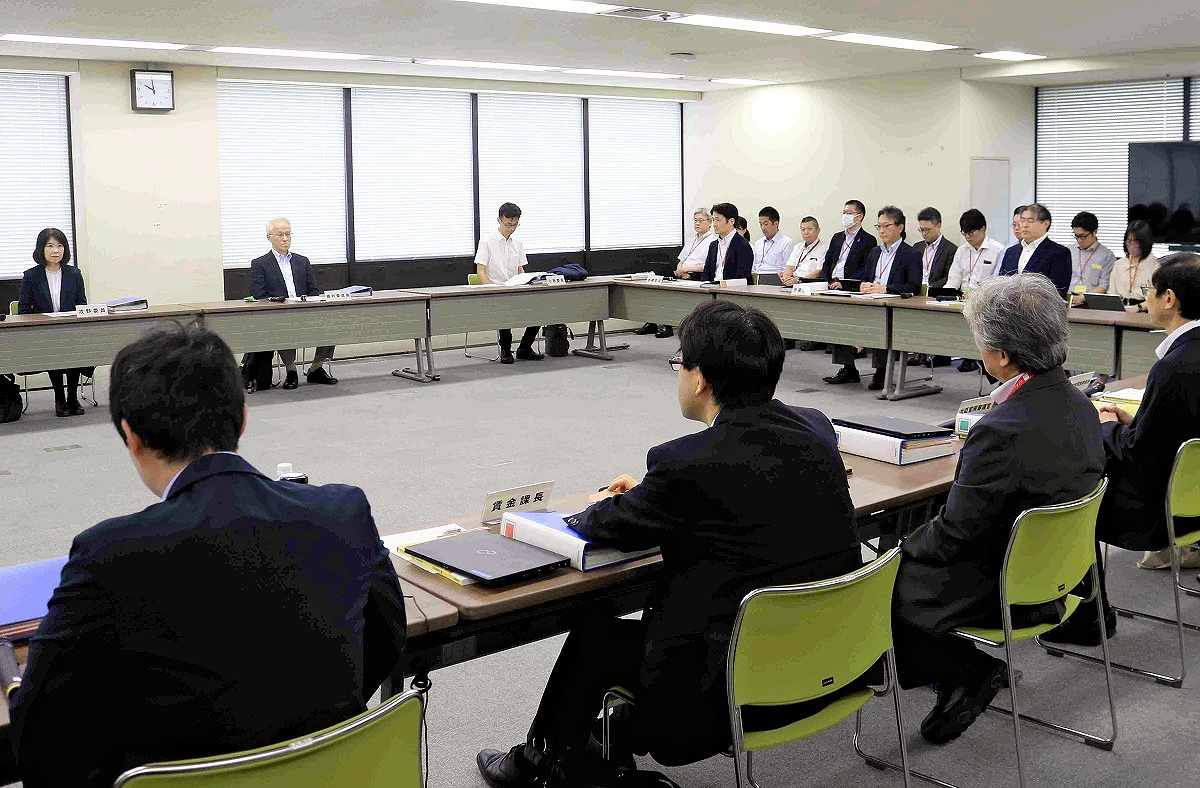Govt Panel to Propose ¥50 Raise in Average Minimum Wage; Increase Would Set Record High for 4th Straight Year

Members of a Central Minimum Wages Council subcommittee attend Wednesday’s meeting in Tokyo.
15:49 JST, July 25, 2024
A record-high ¥50 increase in the national average hourly minimum wage is in the offing this fiscal year, as a government advisory panel decided on Wednesday to propose the increase.
The average minimum wage across Japan is currently ¥1,004. The move would lift it by about 5% to ¥1,054.
Against a backdrop of rising prices and other factors, the amount of the increase topped last fiscal year’s ¥43 raise and set a fresh record for the fourth consecutive year.
The minimum wage is the lowest hourly remuneration employers must legally pay their workers. Each year, the Central Minimum Wages Council, whose members include representatives of labor and employer, as well as expert officials representing the public interest, decides on a proposed increase amount based on commodity prices, actual wage levels and other factors. Each prefecture determines its minimum wage based on the council’s proposed increase.
A subcommittee of the council, which is an advisory body to the health, labor and welfare minister, would, in a typical year, divide Japan’s 47 prefectures into three groups based on their economic conditions and other factors, and present separate proposed increases for each group. Group A has six prefectures, including Tokyo; B includes 28 prefectures such as Kyoto; and C has 13 prefectures, including Okinawa. But this year, the subcommittee recommended a ¥50 increase across the board.
If the minimum wage is increased as proposed, Hokkaido, Shizuoka, Mie, Hiroshima and four other prefectures would join the eight prefectures where the minimum wage already exceeds ¥1,000. Osaka would become the third prefecture, after Tokyo and Kanagawa, with a minimum wage above ¥1,100.
During subcommittee discussions that began June 25, the labor side called for a hefty increase of above ¥60, given the sharp increase in commodity prices in recent years. However, the employers’ side called for an increase of about ¥20 to be considered.
According to sources, during the final discussions that began Tuesday, the officials representing the public interest suggested both the labor and management sides to settle on a significant increase in the minimum wage. However, the talks were carried over into Wednesday because both sides saw a need for further discussion of issues such as the economic indicators used as the foundation for determining the scope of the increase.
The minimum wage is intended to help workers live a stable lifestyle. The wage applies to all employees, and an employer who pays less than this amount can be fined up to ¥500,000 based on the Minimum Wage Law. The new minimum wage typically comes into effect from October.
In fiscal 2023, the minimum wage was hiked by a record-high ¥43, and the national average climbed above ¥1,000 for the first time.
The government has set a goal of raising the national average minimum wage to ¥1,500 by the mid-2030s, as has been spelled out in the Basic Policy on Economic and Fiscal Management and Reform that was approved by the Cabinet in June. Given this, many observers had been closely watching for the size of the increase that would be set for this fiscal year.
Top Articles in Business
-

Prudential Life Insurance Plans to Fully Compensate for Damages Caused by Fraudulent Actions Without Waiting for Third-Party Committee Review
-

Narita Airport, Startup in Japan Demonstrate Machine to Compress Clothes for Tourists to Prevent People from Abandoning Suitcases
-

Japan, U.S. Name 3 Inaugural Investment Projects; Reached Agreement After Considerable Difficulty
-

Toyota Motor Group Firm to Sell Clean Energy Greenhouses for Strawberries
-

SoftBank Launches AI Service for Call Centers That Converts Harsh Customer Voices into Softer Voices
JN ACCESS RANKING
-

Japan PM Takaichi’s Cabinet Resigns en Masse
-

Japan Institute to Use Domestic Commercial Optical Lattice Clock to Set Japan Standard Time
-

Israeli Ambassador to Japan Speaks about Japan’s Role in the Reconstruction of Gaza
-

Man Infected with Measles Reportedly Dined at Restaurant in Tokyo Station
-

Videos Plagiarized, Reposted with False Subtitles Claiming ‘Ryukyu Belongs to China’; Anti-China False Information Also Posted in Japan





















